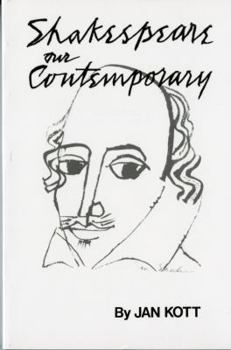Shakespeare Our Contemporary
Select Format
Select Condition 
Book Overview
Peter Brook and Charles Marowitz are among the many directors who have acknowledged their debt to Jan Kott, finding in his analogies between Shakespearean situations and those in modern life and drama the seeds of vital new stage-conceptions. Readers all over the world-- Shakespeare Our Contemporary has been translated into nineteen languages since it appeared in 1961--have similarly found their responses to Shakespeare broadened and enriched. Mary...
Format:Paperback
Language:English
ISBN:0393007367
ISBN13:9780393007367
Release Date:October 1974
Publisher:W. W. Norton & Company
Length:400 Pages
Weight:0.82 lbs.
Dimensions:1.1" x 5.1" x 7.7"
Customer Reviews
3 ratings
Limited but historically important
Published by Thriftbooks.com User , 23 years ago
The value of this very influential book to an individual reader will depend greatly on what that reader hopes to find in it. Someone looking for close, accurate handling of Shakespeare's texts, and thus for reliable guidance on what is found in them, will most of the time feel disappointed: for a book taken so seriously by so many, the criticism on display is actually often surprisingly loose, vague, and general.The importance of the book when it appeared lay in the fact that the author identified certain matters in Shakespeare which earlier critics with sunnier visions of life had usually not seen or wished to avoid seeing. This one must grant Kott, I think, even if his own views are onesided and say often more about him and his experiences than about Shakespeare. There is a kernel of accuracy and truth in what he observes, and this remains something of lasting value.Readers who wish to understand the development of views on Shakespeare since WWII will find this an essential book to know, as so much comment on Shakespeare which today gets offered as new and "radical", especially in relation to the politics of power, can be traced back to Kott, although fashionably extreme views on *The Tempest* as simply a "post-colonial" text with Prospero as nothing other than a wicked imperialist and Caliban as the noble savage who can do no wrong are a good deal more simplistic than anything presented by Kott. Still, much of what is extreme today can be seen as having some of its origins in his thinking. - Joost Daalder, Professor of English, Flinders University, South Australia
A Classic of Modern Shakespeare Criticism
Published by Thriftbooks.com User , 24 years ago
This is not - repeat not - necessarily a call for the Midsummer Night's Dream fairies to be played as a motorcycle gang, Richard III to be played as Hitler or Romeo to shoot up instead of drink poison - although this book has inspired all of the above. It is, however, a brilliant call for actors and directors to bring their life experience to Shakespeare.In Kott's case, this means life under communist Poland. He identifies with those characters who live under regimes in which one wrong word can mean the gallows - especially those characters in the history plays. Yes, if we think about it, their sense of dread and suspicion must have drastically affected their whole lives - but it is Kott's genius to state the obvious so eloquently. This is politics not as rhetoric but as it affects everyday life. A must read for anyone who loves or is about to act in Shakespeare's political plays.
Essays Against the Grain
Published by Thriftbooks.com User , 24 years ago
This is a book of interpretive essays about many, but not all, of Shakespeare's plays. Other than Harold Goddard's The Meaning of Shakespeare, this is the best book of Shakespearean criticism I've read. Written in plain, but elegant prose, these essays reveal a darker Shakespeare than most commentators admit. Kott was a fighter in the Polish resistance and assumes Shakespeare must have had knowledge of political repression and loss of freedom. The best of the essays deal with the History plays. Kott argues that all of the History plays are about power and use the metaphor of a staircase. A king is shown to be weak or unjust, a usurper claws his way to the top and then must remove all rivals, and then is toppled by another. Different plays show different pieces of this process. Lear views the staircase from the way down. Richard III is about his joyful ascent up the staircase. The various Henry's (and Richard II and King John) show its endless cycle. The essay on Richard III must have been the inspiration behind the interpretation used by the recent movie version with Ian McKellum. The essay about Othello concentrates on the evil power of Iago. Is there an wonder why Iago is silent in the end? According to Kott, it is because his worldview has won.The essay on A Midsummer Night's Dream challenges the normal interpretations that this is a happy comedy about confused love. According to Kott, the play is really about the animosity and power struggle behind love, and rather than loving, the characters really compete with one another.






